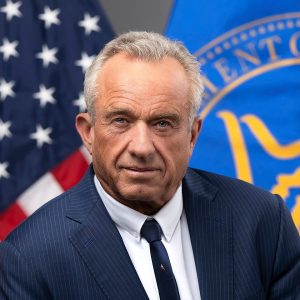 ABC News, HHS firings, questioning safety of vaccines: How the Trump administration may be ‘attacking’ science, Mary Kekatos, April 29, 2025. Officials have been questioning what is believed to be established science.
ABC News, HHS firings, questioning safety of vaccines: How the Trump administration may be ‘attacking’ science, Mary Kekatos, April 29, 2025. Officials have been questioning what is believed to be established science.
The first 100 days of President Donald Trump’s second term have been filled with mass firings, cancellations of research grants, university funding cuts and questions over what should be studied.
Thousands of people have been let go at federal agencies and critical research has been put on hold. Additionally, Health and Human Services Secretary  Robert F. Kennedy Jr., right, has questioned the safety and efficacy of vaccines and antidepressant medications despite dozens of studies proving they are safe and effective.
Robert F. Kennedy Jr., right, has questioned the safety and efficacy of vaccines and antidepressant medications despite dozens of studies proving they are safe and effective.
Doctors and public health specialists critical of the administration tell ABC News they view these actions as an “attack” on science, damaging the reputation of respected agencies and by questioning what is believed to be established science.
MORE: RFK Jr. said HHS layoffs are needed as ‘Americans are getting sicker.’ Here’s what the data shows.
“It’s completely unprecedented,” Steve Cohen, senior vice dean of Columbia University’s School of Professional Studies and a professor of public affairs at Columbia’s School of International and Public Affairs, told ABC News. “It’s frankly a little unhinged. I’ve never seen anything like it.”
The White House did not respond to ABC News’ request for comment.
An HHS official told ABC News that framing the actions of the admiration as an “attack” is “fundamentally dishonest.”
“Further reviewing pharmaceutical products with gold standard science and common sense is not an ‘”attack on science’ — it’s what the American people have asked for and deserve,” the official said. ” Let’s be clear: Secretary Kennedy is not anti-vaccine — he is pro-safety, pro-transparency, and pro-accountability.”
Thousands of layoffs
Earlier this month, HHS began to lay off 10,000 workers as part of a massive restructuring plan.
Sources previously told ABC News that affected offices included most of the Centers for Disease Control and Prevention’s Office on Smoking and Health, key offices in the Center for Tobacco Products, most of the National Institute for Occupational Safety and Health, and the entire assisted reproductive technology team at the CDC.
There have also been local impacts in communities due to federal layoffs. ABC News previously reported in March, the CDC was poised to send its lead ‘disease detectives’ to Milwaukee amid an ongoing lead crisis in schools, but the entire division was cut under sweeping HHS layoffs, leaving local health officials without help they were relying on.
Scientists have also been laid off at NASA, the Environmental Protection Agency, the Department of Agriculture and the National Oceanic and Atmospheric Administration.
Cohen said these firings have put studies on hold and have greatly reduced the capacity of the federal government to review research.
“Scientists inside agencies, whether they’re environmental scientists or medical scientists or people focusing on vaccines or drugs, are being fired, and so some of the research capacity in Washington, in the federal government is being eliminated, and also their ability to judge proposals from universities,” he said.
“The only place I haven’t seen [firings] happen yet are the laboratories,” Cohen added.
Cuts that are currently proposed or have already been implemented include the elimination of the Office of Infectious Disease and HIV Policy, created by Brett Giroir, the former U.S. assistant secretary for health.
Giroir, who helped convince Trump in his first term to set a goal to end the HIV epidemic in the U.S., wrote in a post on social media last week that the president could ruin his legacy and mission with such cuts.
Canceling research grants, funding cuts to universities
Millions of dollars’ worth of grants have been terminated at the National Institutes of Health related to studies involving LGBTQ+ issues, gender identity and diversity, equity and inclusion (DEI) because they do not “effectuate” the “priorities” of President Donald Trump’s administration, according to copies of termination letters sent to grant recipients and viewed by ABC News.
Dr. Harold Varmus, a cancer researcher at Weill Cornell Medicine in New York City and former director of the NIH, said these terminations are “detrimental” because they may be affecting people in the middle of clinical trials, or affecting the early stages of experimental work.
Research projects focusing on minority populations have major benefits, Varmus noted.
“The purpose of health research in this country is to address problems faced by everybody and to explore every facet of a population that may affect their health,” he said. “To single out certain categories of individuals who would not be appropriate to study seems ludicrous to me … one of the great strengths of America is that we are diverse.”
May 1 The Ithacan, Q&A: President La Jerne Cornish discusses financial challenges and issues with the federal government, Lorien Tyne and Kaeleigh Banda, May 1, 2025. Editor-in-Chief Lorien Tyne and News Editor Kaeleigh Banda spoke with Ithaca College President La Jerne Cornish about how IC is responding to institutional financial challenges and political pressures from the federal government.This interview has been edited for length and clarity.
Kaeleigh Banda: Two of the college’s scholarships are under investigation right now for alleged racial discrimination, and you recently attended an SGC meeting and stated, “We will comply with the law when it’s the law, but it’s not the law yet,” regarding those anti-DEI efforts. Can you just expand on what you meant by that?
La Jerne Cornish: The only criterion for eligibility for each of those scholarships is that you are a current undergraduate student. We do not admit students to Ithaca College based on race. … So somebody made some assumptions about the scholarships, and it was inaccurate.
KB: You recently signed “A Call for Constructive Engagement.” Can you talk more about the decision-making behind that?
LJC: It’s who we are and what we stand for as an institution. I just repeated what our strategic planning goal is. We are going to continue to defend people’s freedom of speech, freedom to express themselves [and] right to protest. What this [federal] administration is doing goes against our values, and I don’t mind signing something in support of our values.
KB: How does this institution plan on following through on all those points made in “A Call for Constructive Engagement?”
April 21 Cornell Daily Sun, ‘Ithaca is Under the Microscope’: Amid Immigrant Crackdowns, Open Doors English Fosters Belonging Through English Learning, Shubha Gautam, April 21, 2025. Operating out of the third floor of Ithaca’s First Presbyterian Church, Open Doors English teaches English as a second language to adults through beginner, intermediate and advanced level classes taught four days a week.ODE serves students who speak 29 different languages, and just within the last year they have enrolled over 260 new students “regardless of their personal circumstances or ability to pay,” according to a March 27 press release from the organization.
Hilary Boyer, co-director of ODE, said the organization grew out of a wish to “serve everybody that needed [ESL services] in the community.” Previously, Boyer and five of the eight current educators and administrators at ODE worked as ESL teachers at the Tompkins-Seneca-Tioga Board of Cooperative Educational Services.
During the 2018-2019 school year, however, TST BOCES limited ESL enrollment to students planning to enter the workforce. According to Boyer, educators felt this decision unfairly left out students without legal permission to work, such as asylum-seekers who must wait 180 days after their initial asylum application to receive a work permit and students with young children.
Boyer and her fellow teachers decided to start a volunteer ESL program open to everyone, which ran for a semester before being officially established as ODE in Fall of 2019. With an umbrella 501(c)3 status from the Center for Transformative Action, ODE runs off community donations and grants, according to Boyer.
April 18 Cornell Review, Why the Endowment Won’t Solve Cornell’s Problems, Staff Report, April 18, 2025. Cornell is facing many challenges, particularly the Trump Administration is suspending $1 billion in federal research grants due to alleged antisemitism and improper diversity, equity, and inclusion (DEI) programs.
Cornell Review, Why the Endowment Won’t Solve Cornell’s Problems, Staff Report, April 18, 2025. Cornell is facing many challenges, particularly the Trump Administration is suspending $1 billion in federal research grants due to alleged antisemitism and improper diversity, equity, and inclusion (DEI) programs.
For the year ending June 30, 2023, Cornell received $157 million in state and federal appropriations, $826.5 million in federal grants, and $70.7 million in state grants. This compares with $307 million in grants from the private sector. Yet, all of these are small parts of Cornell’s $5.9 billion in annual operating expenses.
In response, many people are asking whether Cornell can withstand this challenge by using its endowment to fill the gap. As of March 2025, the endowment was worth $10,332,429,674, which is the 14th largest in the country. However, most experts claim that a better measurement is the endowment per student, and Cornell ranks 71st by that measure.
April 14 Ithaca.com, At Least Six Cornell Students Have Had Visas Revoked By State Department, Matt Dougherty, April 14, 2025. A map published by We Are Higher Ed, above, shows universities across the northeastern United States where international students have had their visas revoked or SEVIS records terminated.
Ithaca.com, At Least Six Cornell Students Have Had Visas Revoked By State Department, Matt Dougherty, April 14, 2025. A map published by We Are Higher Ed, above, shows universities across the northeastern United States where international students have had their visas revoked or SEVIS records terminated.
One marker identifies Momodou Taal, a Cornell graduate student whose visa was revoked in March following his participation in pro-Palestinian protests.
April 8The Trump administration has frozen more than $1 billion in funding for Cornell and $790 million for Northwestern amid civil rights investigations into both schools, two U.S. officials said.
 The funding pause involves mostly grants from and contracts with the Departments of Agriculture, Defense, Education and Health and Human Services, according to the officials, who spoke on the condition of anonymity to discuss the unannounced decision.
The funding pause involves mostly grants from and contracts with the Departments of Agriculture, Defense, Education and Health and Human Services, according to the officials, who spoke on the condition of anonymity to discuss the unannounced decision.
The moves are the latest and largest in a rapidly escalating campaign against elite American universities that has resulted in billions in federal funds being suspended or put under review in just over a month. Other schools that have had funds threatened include Brown, Columbia, Harvard, the University of Pennsylvania and Princeton.
Cornell and Northwestern are both facing investigations into allegations of antisemitism and into accusations of racial discrimination stemming from their efforts to promote diversity.
Cornell officials said in a statement that they had received more than 75 stop-work orders from the Defense Department on Tuesday, but that they had no information to confirm that more than $1 billion in funding had been suspended. The affected grants, they said, supported research that they described as “profoundly significant to American defense, cybersecurity and health.”
“We are actively seeking information from federal officials to learn more about the basis for these decisions,” said the joint statement from Michael Kotlikoff, the university president; Kavita Bala, the provost; and Robert Harrington, provost for medical affairs.
Jon Yates, a spokesman for Northwestern, said that the university had not been notified by the federal government that funding had been frozen.
Northwestern, a Big Ten university, is the first non-Ivy League school to have funding from the Trump administration targeted under investigations of alleged discrimination. The university issued a “progress report” last week that highlighted its efforts to protect Jewish students, including mandatory antisemitism training for all students, faculty and staff.
“Federal funds that Northwestern receives drive innovative and lifesaving research, like the recent development by Northwestern researchers of the world’s smallest pacemaker, and research fueling the fight against Alzheimer’s disease,” Mr. Yates said. “This type of research is now at jeopardy.”
March 21
Credit: Ryan Young / Cornell University
Cornell University / Cornell Chronicle, Michael Kotlikoff named Cornell’s 15th president, David Nutt, March 21, 2025. The Cornell Board of Trustees today voted to appoint Michael I. Kotlikoff, who has served as interim president since July 2024, Cornell’s 15th president, effective immediately.“Over the last eight months as interim president – and his 25 years on Cornell’s faculty – Mike has demonstrated the leadership and vision that the university needs right now,” said Board of Trustees Chair Kraig Kayser, MBA ’84. “His institutional knowledge, expertise and passion for our shared mission will continue to help him lead Cornell through a period of great uncertainty and provide much-needed continuity at a critical time.”
As interim president, Kotlikoff has sought to foster connection and dialogue on campus and to highlight the unique attributes of Cornell – including its history and its ethos.
“I’ve spent 25 wonderful years at Cornell, and serving this university is an honor and a privilege,” Kotlikoff said. “I’m committed to finishing my career here, leading an institution I love through these challenging times. As higher education across the U.S. navigates difficult political, financial and societal headwinds, I hope to guide Cornell in ways that reflect our core principles as an institution committed to doing ‘the greatest good.’”
A professor of molecular physiology, Kotlikoff arrived at Cornell in 2000 to build a new department in biomedical sciences at the College of Veterinary Medicine (CVM). He also launched and led the university’s Mammalian Genomics Life Science Initiative. He was named dean of CVM in 2007, and he became university provost in 2015.
“Mike has been a dedicated advocate and champion for Cornell for decades,” said Anne Meinig Smalling ’87, chair of the Board of Trustees Executive Committee and the incoming board chair. “His values, knowledge and insights are deeply appreciated by all who know him. I and the other trustees look forward to working with Mike in the months and years ahead.”
Previously, Kotlikoff was professor and chair of the Department of Animal Biology at the University of Pennsylvania, where he earned his B.A. in 1973 and VMD in 1981, with a Ph.D. from the University of California, Davis, in 1984.
A professor of molecular physiology, Kotlikoff arrived at Cornell in 2000 to build a new department in biomedical sciences at the College of Veterinary Medicine (CVM). He also launched and led the university’s Mammalian Genomics Life Science Initiative. He was named dean of CVM in 2007, and he became university provost in 2015.
“Mike has been a dedicated advocate and champion for Cornell for decades,” said Anne Meinig Smalling ’87, chair of the Board of Trustees Executive Committee and the incoming board chair. “His values, knowledge and insights are deeply appreciated by all who know him. I and the other trustees look forward to working with Mike in the months and years ahead.”
Previously, Kotlikoff was professor and chair of the Department of Animal Biology at the University of Pennsylvania, where he earned his B.A. in 1973 and VMD in 1981, with a Ph.D. from the University of California, Davis, in 1984.
By the time he was hired at Cornell in 2000, his research interests had expanded from studying ion channel proteins that control muscle excitability to using genetics to understand the fundamental processes that underlie and limit repair of the damaged mammalian heart. His arrival opened new opportunities for studying mouse genetics at the university. His lab’s breakthroughs included developing optogenetic signaling molecules that can be expressed in mice to explore cell function; ways to use cell therapy to treat cardiac arrythmias in injured hearts; and an understanding of the limits of precursor cells in heart repair. He has published 152 papers and his lab, which he closed in 2021, was continuously funded by the National Institutes of Health since he began his research career. He has served in numerous roles at the NIH, including chairing the Board of Scientific Counselors at the National Heart, Lung, and Blood Institute and serving on the NIH Council of Councils.
Kotlikoff also has the distinction of having been Cornell’s longest-serving provost and served as chief budget officer in addition to chief academic officer. As provost, he helped steward many large and complicated projects, such as the creation of the SC Johnson College of Business and the Cornell Jeb E. Brooks School of Public Policy; the Radical Collaboration initiative; the North Campus Residential Expansion; and the university’s COVID-19 response.
His wife, Carolyn McDaniel, retired in 2024 as a professor of practice in CVM. They have two children: Phoebe, a lawyer and former submarine officer with the U.S. Navy, and Emmett ’16, who graduated from Cornell with a bachelor’s degree in computer science and currently works for Google.
June 23-26, 1994Carl Sagan predicted today’s United States 30 years ago in this prescient speech given back in 1994.
“And it’s a foreboding I have, maybe ill placed, of an America in my children’s generation or my grandchildren’s generation; when all the manufacturing industries have slipped away to other countries; when we’re a service and information processing economy; when awesome technological powers are in the hands of a very few and no one representing the public interest, can even grasp the issues; when the people have lost the ability to set their own agendas or even to knowledgeably question those who do set the agendas; when there is no practice in questioning those in authority when clutching our crystals and religiously consulting
processing economy; when awesome technological powers are in the hands of a very few and no one representing the public interest, can even grasp the issues; when the people have lost the ability to set their own agendas or even to knowledgeably question those who do set the agendas; when there is no practice in questioning those in authority when clutching our crystals and religiously consulting  our horoscopes, our critical faculties in steep decline, unable to distinguish between what’s true and what feels good, we slide things to the noticing into superstition and darkness. That worries me, and I don’t think that, we have adequate protections against that. I don’t think this is just a a kind of fantasy. There are reasons to worry.”
our horoscopes, our critical faculties in steep decline, unable to distinguish between what’s true and what feels good, we slide things to the noticing into superstition and darkness. That worries me, and I don’t think that, we have adequate protections against that. I don’t think this is just a a kind of fantasy. There are reasons to worry.”
This excerpt is from Carl Sagan’s keynote address “Wonder and Skepticism” at the CSICOP Conference in Seattle, Washington, June 23-26, 1994. This passage would appear in his 1995 book, “The Demon-Haunted World: Science as a Candle in the Dark.”

Carl Sagan, one of Cornell’s most famous faculty members, poses with a model of the Viking lander in Death Valley, California. Oct. 26, 1980. Source: NASA Jet Propulsion Laboratory. At Cornell, where Sagan was a faculty member from 1968 until his death, he was the David Duncan Professor of Astronomy and Space Sciences and Director of the Laboratory for Planetary Studies.
Cornell’s Uris Library: One of Cornell’s most famous faculty members and a prolific scholar, Carl Sagan (1934-1996) is probably best remembered as a television personality. Through his Peabody award-winning PBS series and book, Cosmos (1980), and many appearances with Johnny Carson on the Tonight Show, Sagan inspired millions of viewers and readers, popularizing science for a vast audience.His success may have had to do with his infectious enthusiasm for astronomy’s “billions and billions” of opportunities. His prominence was based, however, on an impressive career that included advising NASA, countless awards (including the 1978 Pulitzer Prize for general non-fiction for his The Dragons of Eden: Speculations on the Evolution of Human Intelligence, 1977), and influential research on atmospheric conditions on Venus, Mars and Titan.
###

